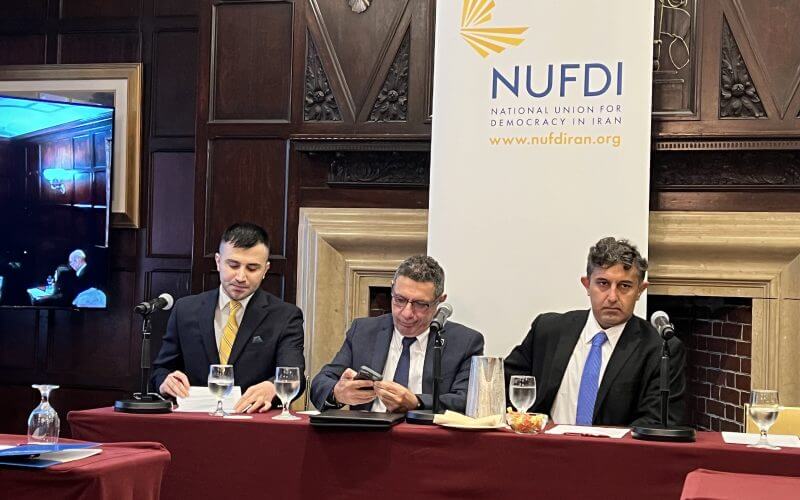1. The Speakers/Plaintiffs
In New York, the National Union of Democracy in Iran (NUFDI) hosted a live Press Conference where a group of high-profile Iranian dissidents and former hostages from the West held in Iran announced a federal civil case in the Southern District of New York against former Judicial Chief now Iranian President Ebrahim Raisi. The plaintiffs included former Shiraz City Councilor Mehdi Hajati, Australian academic former hostage Dr. Kylie Moore-Gilbert, and former hostage Hamid Babaei, all represented by Iranian American human rights attorney Shahin Milani. The speakers for this press conference included Navid Mohebbi and Ahmad Batebi, former political prisoners in Iran and Raisi victims. In their remarks, the speakers discussed the lawsuit in full detail and described the Iranian President's actions the day before his address to the United Nations (U.N.) General Assembly.
2. The Allegations
In their complaint, the plaintiffs allege that they are victims of acts of brutal torture and interrogation under the direct orders, aid, and assistance of Raisi through his authorization, implementation, or oversight of such actions. According to the legal representation of the plaintiffs, Raisi is civilly liable under the Torture Victim Protection Act, a United States law prohibiting torture committed by public officials under color of law against persons within the public official's custody or control. The claims levied against Raisi include torture, intentional infliction of emotional distress, assault and battery, and false imprisonment. Should their case succeed, the plaintiffs seek compensatory and punitive damages from Raisi and the Islamic government. The ultimate goal for the plaintiffs is to bring justice and avenge the victims and their families who have long suffered under Raisi's rule.
3. The Significance
The litigation against Raisi is significant because he would be the only individual subject to a personal, civil lawsuit in U.S. federal court for his role in the torture of Iranian citizens and hostages from other nations. Victims of Raisi's rule argue that such a step today would go toward the victims and prove that the Iranian President's crimes will not be left unpunished. The suit against Raisi is for his crimes during his time as the country's highest-ranking Islamic judge, where he engaged in sentencing to death thousands of anti-regime protesters and minorities. Regarding the issue of head of state immunity and its extension to Raisi as head of the Iranian government, the legal team argues that it is irrelevant and that the Iranian President is not a member of the Islamic Republic's permanent mission to the U.N., lacking diplomatic immunity. The legal team believes a compelling case can be made to the U.S. State Department, calling on American officials to not grant Raisi functional immunity in this case as sovereign immunity is not an automatic right.
4. Authority
According to the plaintiff's legal counsel, Raisi is protected from legal action only while in the U.N. headquarters district or traveling to and from the area. The plaintiffs argue that the service of process against Raisi may be possible outside the headquarters district if his accommodations fall outside its confines. The plaintiffs and their legal team noted that service could not be effected during Raisi's engagement with U.N.-related activities. However, during the time outside the tight period of Raisi's travel to and from the U.N., attorneys argue that service may be possible. Additionally, service is possible when engaging in non-U.N. related activities or traveling to or from non-official activities outside the geographical Headquarters district.
5. Raisi's Response
According to the legal team, the lawsuit filed by the victims would not require the Iranian President to respond. Should Raisi not respond within the statutorily mandated period after service is effected on him, the plaintiffs can request the Clerk of Court to enter default. Upon default entry, the legal proceedings would continue with Raisi, and the plaintiffs would be entitled to file a Motion for Default Judgment, allowing the court to grant a motion against Raisi, favoring the plaintiffs. Raisi and the Islamic government have not responded to the allegations by the plaintiffs yet, but have denied similar allegations made by human rights activists, Iranian dissidents, and Western officials. Should the Iranian government respond to the charges, many experts expect the regime to pull all legal and financial resources to defend Raisi. The plaintiffs are supported by NUFDI, receiving support from its policy director Cameron Khansarinia and many other activists.










